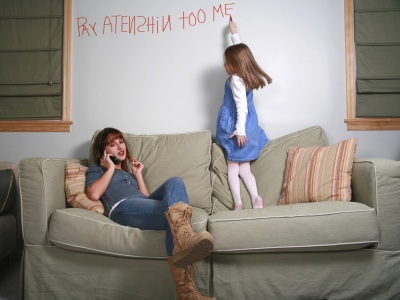|
|
April 6, 2016
 Attention must be paid… when they’re little and when they’re teens. From today’s IN BOX, a letter from a teen who blames her mom for her falling grades and friendship issues. Fair or unfair? Read on…
Hey Annie,
My mom is incredibly busy at work and she just remarried. I’m 17 years old, but I still need her support and attention. If I try to ask her to listen to me for a minute or if I ask her for anything at all, she gets angry and annoyed, and I get a lecture and punishment.
My grades are going down, I’m losing my friends, people have started rumors about me, and I feel incredibly depressed. All these are consequences of my mom neglecting her role as a parent.
How can I get her attention without her getting agitated? – Neglected Teen
Dear Neglected Teen,
I’m sorry you are feeling so neglected at home. You know what you need and it sounds like you are not getting it from your mom. That happens. Sometimes kids (of all ages) wish they could get more attention, more understanding, more acceptance from their parents. On the flip side, some kids want less of certain behaviors from their parents (less criticism, less anger, less annoyance, fewer lectures.)
You say your mom gets “angry and annoyed” when you try to talk to her about this. Maybe she lashes out because she feels like you’re attacking her for not being a good mom. I’m not saying it is okay for her to treat you this way. It’s definitely not. I am simply offering a possible explanation to help you understand what might be going on with her, so you do not take it personally.
I am sure you are an awesome girl. And I understand that it hurts you when your mom acts too “busy” to give you what you need. I understand that it can cause you to doubt yourself. But here’s something to think about: You are 17 years old. At some point in everyone’s life we stop waiting for our parents to do things for us. At some point we must take care of ourselves and create close relationships with other people who can give us the support and understanding we need.
Maybe now is the beginning of that time for you. Instead of continuing to let your mother’s “neglect” upset you and bring you down, how about looking elsewhere for the support and positive attention you need? You deserve it. You might start by talking with your school counselor about what’s going on inside. You will find support there.
In friendship,
Annie

February 24, 2016
Coincidence that I got this email and tonight I’m speaking at Pleasanton Library about Connecting for Family Time in the Digital Age? Maybe not so much. Parents feel frustrated by the amount of time their kids spend on their devices. The more kids connect to their friends on one device or another, the less they connect with their school work and their parents. So what can we parents do to help them succeed in school and bring the family closer?
 by Jason Love JasonLove.com Read what this mom is dealing with:
Dear Annie,
How can I get my teenagers to shut off the TV, social media, their phones, etc. and get their homework done? There are too many mornings when they are not prepared for school because they didn’t finish an assignment or they’re not ready for a test. Yet, they spent a lot to time the previous day(s) on their screens!
—Frustrated Mom
Annie: What have you tried, aside from yelling?
Mom: Telling them to set a timer for 10-15 minutes and do nothing else but schoolwork. They don’t comply.
Annie: Think about the addictive nature of screens and you’ll get a better idea of how hard it can be to drag yourself away. I’m not just talking about teens. Ever said to yourself or a family member, “I’m just checking my email. I’ll be there in a minute.”? Next thing you know, you’ve been swallowed and chewed up by the Space-Time Continuum. Yeah, it’s an actual thing.
Call a family meeting to discuss the problem as it relates to school performance. Your job is to open the conversation, not to lay down the law. Come on too strong and they will fight you. Simply tell them their job is to be good students. (Don’t even mention the TV and tech stuff.) Instead, ask them how they feel about how their school progress. Got evidence of grades? Bring it to the meeting.
Your long-term goal is to help your kids become fully responsible for their own school work and their lives. If your kids admit they could be doing better in school, simply say, “I agree. So what do you think is in the way of better grades?” Let them do most of the talking. Help them to connect the dots between their school progress and their screen time.
The best outcome is acknowledging how hard it is (for all of us) to get away from the screen… even when the timer goes off and we know we should stop now. By the way, if anyone in the family uses technology during family meals, that needs to stop. Tonight.
Part of the solution here is an open conversation where everyone has an opportunity to talk about the pluses and minuses of technology. Part of the solution is modeling and reclaiming unplugged time, for focused work and for play, as a family. And part of the solution is accessibility. If the technology isn’t at hand, then it’s easier to resist the urge to pick it up. (Of course this works best when the homework does not require technology!)
Mom: I will have the family meeting and discuss this with them. I was thinking they just didn’t want to do their homework and they were putting it off — which I totally understand.
Annie: Who likes homework?! So, sure, they’d rather do something more “engaging.” But it’s also very true that they don’t have the brain development to resist the lure of screen time. That’s where you can help, and having their buy-in makes you more of a coach and less of a prison warden. Good luck!
Watch my three minute video on Vidoyen about How to Reclaim Family Time in the Digital Age.

November 17, 2015
Terrorism. Roast turkey with stuffing. Refugees. Sweet potatoes with marshmallows. Fear. Trust. Violence. Kindness. We need Thanksgiving more than ever. But who gets the invite and who doesn’t?
 Hello, dear friend. You are welcome. A few years back, my dear friend Bettina was having health issues and emailed: “I know this is incredibly presumptuous and Miss Manners would be scandalized, but I’m wrangling for an invitation for Thanksgiving.” (Yes, she actually wrote that.)
I couldn’t believe she assumed she’d crossed the line by saying, “I’m not feeling well and I don’t want to be alone. Can I come over?” I called immediately and gave her top marks for asking for what she needed. She was relieved knowing she’d done the right thing by speaking up.
Most of us are quicker to stand up for others than for ourselves. On some level we must believe it’s a sign of weakness to ask for support. But where does that foolishness come from? Not long ago I asked a bunch of 6th-8th graders to rate themselves on two statements: “It’s easy for me to ask for help” and “I lie and pretend things are OK when they aren’t.” The results? Twenty-five percent of the kids said it was “never or almost never” easy to ask for help. Another 25 percent reported that “sometimes” they had trouble asking for help. Another sad finding: A whopping 83 percent admitted that “sometimes, always, or almost always” they fudge the truth and pretend things are OK when they aren’t.
An inability to ask for help, coupled with a habit of pretending things are fine when they’re not, is unhealthy. When we deny our human need to connect heart-to-heart we short-change ourselves and the people who love us.
Teaching kids to be good people includes helping them get comfortable asking for support. Sure, self-reliance is essential, so is resilience and learning to calm yourself when stressed. But inner resources aside, we all feel vulnerable at times. We are also interdependent. When we let people know how we feel and allow them to love us and help us, we honor our humanity. We do the same when we welcome others to our table, our classroom, our community.
When Bettina reached out to me, I was filled with love for her. I wanted to help, but our family was heading out of town for Thanksgiving. With my encouragement she confidently expressed her needs to another friend who gladly opened his heart and home. What would surely have been a sad and lonely day for her turned into a wonderful experience of friendship and a sense of belonging.
Less than two years later Bettina died. I’m comforted knowing she wasn’t alone that Thanksgiving. I admired her courage in reaching out and asking for what she needed. She taught me a powerful lesson: When it comes to friends and family, hold nothing back. Allow yourself to love and be loved fully, without limits.
Happy Holidays, from our family to yours.
 Peace

December 17, 2013
Excerpted from my book, Teaching Kids to Be Good People.
 A no-tech solution to connection addiction While we’re all moving in ten directions at once, online and off, the notion of evenings and weekends where parents and kids spend unplugged time together is laughably retro. But life is neither virtual nor infinite. We’ve got to create an antidote to 21st century craziness otherwise our kids will grow up without us really knowing them and without them knowing us.
Listening (the old- fashioned way) with open eyes, mind, and heart is the best way we connect with our kids, and teach them how to connect with others. That’s what we want from them and for them. They need it now while they’re still learning about healthy relationships from us, so they can use it later when they’re creating intimate relationships of their own.
How do we teach them that the people we care about aren’t just on Facebook and Twitter, they’re right here in the real world and they deserve our attention?
Fuel for Thought—Think about a relationship you have where the other person is often “distracted.” What’s it like being with him/her? Contrast that with someone who is normally “there” with you. Now think about the level of “there-ness” you give to your family. Set a goal for the next week: Do a better job being with your family when you’re actually with them. Do not allow distractions to get in the way. Observe what happens.
Conversations That Count—Talk with your partner and child(ten) about digital distractions, including phones, games, TV shows, and computers. Ask them to rate the family (on a 1–10 scale) regarding the presence of distractions while people are talking to each other.
(Scoring scale: 1 = When we talk to each other, we’re not doing anything else; 10 = When we talk to each other there’s always a “distraction” present.)
Your 21st century child may not even have noticed or considered these “distractions” as anything other than “normal.” Ask what s/he thinks family life (vis-à-vis “distractions”) might look like when s/he’s grown up with their own family.
Teach—Create an Unplugging Challenge. Start small and doable. For example, “On Saturday from 4:00–5:00 p.m. we’re unplugging for an hour to do something fun, together, as a family.” Be ready for pushback from tweens/teens. Remind them it’s only for one hour. “Surely you guys can last 60 minutes w/o FB?!” “Yeah, of course we can, but we don’t want to!!!” The more resistance, the more likely your kids have a connection addiction. But don’t cave. Be upbeat. Take suggestions for a non-tech activity the family can do together for that short time. Play a board game, card game, make popcorn, build something, cook something, bake something, create something, take a walk, go for a bike ride, have an impromptu meal outside, read aloud from a mystery book, look at old family photos and tell stories. Etc. etc. Be together. Focus on each other. Have fun. Repeat often. Appreciate being a family. It’s the best gift there is during any season.

| |















